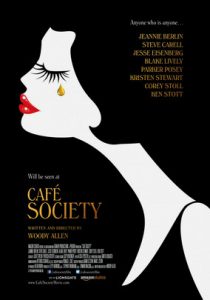Café Society-2016
Director Woody Allen
Starring Jesse Eisenberg, Steve Carell
Scott’s Review #462
Reviewed August 11, 2016
Grade: B+
Having received sub-par reviews but wanting to see this film for myself, as it is a Woody Allen film, and I have yet to see an Allen film I did not like, I traversed to my local theater to see this flick.
I was not disappointed, though others did not share my opinion.
To love Woody Allen films is to love quirky characters who are either neurotic, damaged, or, more often than not, both.
Also notable to Café Society (2016) is the stellar cast of who’s who, many in minor cameo roles, another trademark of Woody Allen films.
Marisa Tomei, Daniel Radcliffe, and television stars Anna Camp (True Blood) have tiny roles, as do stars such as Sheryl Lee (Twin Peaks) and Tony Sirico (The Sopranos).
Additionally, Woody Allen himself narrates the film- a highlight.
The main stars of Café Society are Jesse Eisenberg and Kristen Stewart, both ideally cast.
The setting (which I adored) is 1930s Hollywood, and the action traverses between California and New York City, another common bond in Allen’s films.
Eisenberg plays Bobby Dorfman, a Jewish son of a working-class jeweler who has many siblings. Tired of New York, he flies to Los Angeles to obtain work with his hotshot Uncle Phil, played by Steve Carrell, who knows every celebrity.
There, he meets Vonnie (Stewart), and they fall in love, Bobby unaware of her on-and-off love affair with Phil.
The set and costume designs are to die for, and as a fan of this glamorous period in history, I find it an extraordinary visual treat.
Café Society is a prime example of a film that feels authentic to its time rather than appearing staged with actors merely dressed up in appropriate attire. This is tougher to achieve than one might imagine.
Despite contrary opinions, I enjoyed how most characters were wishy-washy and unsure of their motivations or feelings toward others.
Vonnie loves Phil, and then she warms to Bobby, who has been in love with her since their first meeting. She innocently shows him around Hollywood’s palatial mansions.
She is honest with Bobby but then makes a decision and becomes everything she once despised about Hollywood: a shallow, trophy wife.
Ironically, Bobby becomes involved with a stunning new woman named the same as his ex back in New York. This coincidence is crucial to the film’s point. He transfers his feelings to another woman, but is he pleased?
It did not bother me, though perhaps it should have, that several characters were introduced for a scene or two and then mysteriously dropped.
For instance, the novice hooker, Candy, having tried to make it as an actress and failed, has a heart of gold. However, after her awkward attempt at a tryst with Bobby, the character is never seen again.
Another characteristic of the film that I enjoyed is the natural, overlapping dialogue between the characters. It makes them more genuine and evokes my fondness for Robert Altman films, which used a similar technique with their actors.
The point of Café Society is that nobody ever gets what they want, and the film makes a point that nobody knows what they want.
Containing elements common to other Woody Allen films, Café Society (2016) is intended for fans of his lengthy work.
